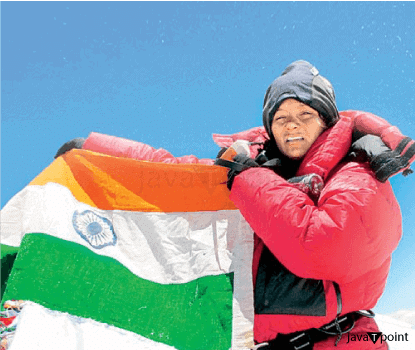Class 9 English Chapter 7 Important Question Answers - Reach for the Top
Part 1: Santosh Yadav
Q1. What is the special distinction of Santosh Yadav as a mountaineer?
Ans: Santosh Yadav holds the remarkable distinction of being the only woman in the world to conquer Mount Everest twice. Her achievements are particularly impressive considering she rose from a rural background, overcoming societal and familial barriers.

Q2. What type of social system was present in the village when Santosh was born?
Ans: During Santosh Yadav’s birth, the social system in her village was deeply patriarchal. The birth of a son was considered a blessing, while the birth of a daughter was generally not celebrated and often viewed as a burden.
Q3. Give a brief sketch of Santosh Yadav's family.
Ans: Santosh Yadav was born in the small village of Joniyawas in Haryana. Her parents were affluent landowners, and she was the only sister to five brothers, making her upbringing in a traditional, male-dominated environment.
Q4. How did Santosh show a contradiction to her name?
Ans: Santosh’s name means “contentment,” yet she was anything but content with the traditional expectations imposed on her. From an early age, she rebelled against societal norms, choosing to live life on her own terms. She defied her family’s expectations and sought education and independence.
Q5. What did Santosh tell her parents regarding her marriage?
Ans: Santosh opposed the idea of early marriage. She firmly told her parents that if she couldn’t get a proper education, she would refuse to marry at all. Her strong stance on the matter eventually led her parents to support her educational goals
Important Long Answer Questions
Q1. Write a brief character sketch of Santosh Yadav.
Ans: Santosh Yadav, born in a traditional village in Haryana, embodied courage, determination, and resilience. Despite societal norms that encouraged early marriage and limited opportunities for girls, Santosh carved her own path. She pursued education, defied family pressures, and developed a passion for mountaineering. Against all odds, she enrolled in a mountaineering course and eventually scaled Mt. Everest not once, but twice, a testament to her strength of character. Her independent spirit, combined with her dedication to her dreams, makes her a role model for women everywhere.

Q2. How did Santosh create her own destiny?
Ans: Santosh Yadav refused to let societal norms dictate her future. Despite being born into a family that followed traditional values, she took charge of her life. She rejected early marriage, chose to pursue higher education, and fought to follow her passion for mountaineering. By making bold decisions and persisting through challenges, she shaped her own destiny, becoming an inspiring figure for women in similar situations.
Q3. Santosh decided to challenge the system in her own quiet way, according to the author. How did Santosh rebel quietly?
Ans: Santosh Yadav’s rebellion against societal norms was subtle but powerful. Instead of loud protests, she took firm yet quiet actions. When her parents pressured her into marriage, she calmly refused and sought education in Delhi. When they wouldn’t pay for her schooling, she confidently said she would earn her fees by working part-time. This quiet determination allowed her to pursue her dreams while changing the attitudes of those around her.
Q4. Santosh had all the qualities of a good mountaineer. Comment.
Ans: Mountaineering requires physical strength, mental resilience, courage, and a strong sense of teamwork. Santosh Yadav exhibited all these qualities. Her determination enabled her to conquer Everest twice, and her leadership on expeditions earned her the respect of her peers. She not only excelled in difficult conditions but also showed immense bravery by risking her life to help fellow climbers in distress.
Q5. Santosh isn’t just a good mountaineer but also a very good person. Discuss.
Ans: Beyond her exceptional mountaineering skills, Santosh Yadav’s kindness and selflessness set her apart. She once shared her oxygen supply with a fellow climber, saving his life. Additionally, she showed deep love for her country by proudly hoisting the Indian flag on Everest. Her environmental consciousness was also evident as she helped clean the mountain, removing waste from its slopes. Santosh’s character demonstrates both a strong mind and a compassionate heart.
Part 2: Maria Sharapova
Q1. What do you know about Maria Sharapova?
Ans: Maria Sharapova is a famous tennis player who won the Wimbledon women's singles title in 2004 and became the world’s number one player in 2005. Originally from Russia, Maria trained in the U.S. from a young age. Besides tennis, she enjoys dancing, singing, and reading. Her immense dedication to her sport has been key to her success.
Q2. How is Maria’s personality a mix of contrasts?
Ans: Maria Sharapova’s personality blends elegance with toughness. While she exudes grace and charm, her inner self is marked by grit and determination. Her glamorous appearance is contrasted by her competitive and resilient nature, making her both approachable and a fierce competitor.
Q3. Maria possesses some contradictory characteristics. What are they?
Ans: Maria Sharapova’s public image is stylish and glamorous, but her personal demeanor is friendly and grounded. She enjoys wearing evening gowns but also has a penchant for simple snacks like pancakes with chocolate spread. This combination of sophistication and simplicity defines her unique personality.
Q4. Explain: “all this happened in almost no time.”
Ans: The phrase “all this happened in almost no time” refers to Maria Sharapova’s meteoric rise to fame. In just four years, she went from a young tennis hopeful to the top-ranked women’s tennis player in the world, showcasing her incredible talent and drive.
Q5. What does Maria declare to be her mantra for success?
Ans: Maria Sharapova’s mantra for success is built on hard work, sacrifice, and the ability to stay focused on her goals. She is driven by a relentless ambition to be the best and emphasizes the importance of a competitive spirit. Her dedication to improving in every aspect of her life has helped her achieve remarkable success.
Important Long Answer Questions
Q1. What problems did Maria face as a child while being trained for tennis in the U.S.? What sustained her?
Ans: Maria Sharapova faced numerous challenges as a child while training for tennis in the U.S. At just nine years old, she moved to Florida, separated from her mother due to visa issues. The loneliness was compounded by bullying from older trainees and her father’s long working hours to support her. However, her unwavering love for tennis and determination to succeed kept her going. She turned every hardship into a learning experience, using her difficulties to fuel her drive to become the best tennis player in the world.
Q2. Compare and contrast the lives of Santosh Yadav and Maria Sharapova.
Ans: Both Santosh Yadav and Maria Sharapova share a story of overcoming adversity to achieve greatness. Santosh, born in a small village in India, fought societal norms to become the first woman to conquer Everest twice. Similarly, Maria, originally from Russia, trained in the U.S. to become the world’s top tennis player. While Santosh battled against conservative family expectations, Maria faced isolation and bullying in a foreign land. Despite their different paths, both women displayed remarkable determination, resilience, and ambition, proving that hard work leads to success.
Q3: Imagine you are Maria Sharapova. It is your tenth birthday, but you neither have your parents nor your friends with you to celebrate it. You do not talk to your fellow pupils because they bully you. Write a diary entry in about 150 words recording all your thoughts.
Ans:
Dear Diary,
Today I turned ten, my first birthday away from Siberia where my loving parents and friends are. I feel incredibly lonely, reminiscing about the joyous parties of birthdays past, where friends danced and sang while my parents showered me with love and blessings. I vividly recall the excitement of wearing the latest fashion and eagerly opening presents.
Today, I ventured alone to buy a small cake and candles after Mom insisted I celebrate. I couldn't invite my fellow players; they're too mean and bullying. It's hard not having family or friends nearby.
But I must stay strong; loneliness is the price I pay for my ambitions. I know my parents' love and blessings are with me always, transcending distance. This is just one more challenge to overcome, like those on the tennis court. Each day brings me closer to my dream. I'll continue to work hard and make them proud, even if it means sacrificing so much now.
One day, I will become the world's best, and all of this hardship will be worth it.
Love,Maria
Q4: Discuss Maria Sharapova’s journey to success and the sacrifices she made to reach the top.
Ans:
Maria Sharapova's journey to success is one of immense struggle and personal sacrifice. Born in Siberia, Russia, she showed promise as a tennis player at a young age, prompting her father to take her to the U.S. for better training. However, her path was anything but smooth.
At just nine years old, Maria had to endure the separation from her mother due to visa restrictions, a heartbreaking two-year period during which she and her mother couldn’t reunite. Her father, who accompanied her to the U.S., worked multiple jobs to support her training while Maria faced loneliness and bullying from older players at the tennis academy.
Despite these overwhelming obstacles, Maria remained focused on her goal. Her mental toughness, physical endurance, and relentless dedication paid off when she became the world’s number one tennis player at just 18. Throughout her journey, Maria sacrificed her childhood, her family’s company, and a carefree life for the sake of her dream, demonstrating extraordinary resilience and determination.
Q5: How did Maria Sharapova handle the adversities she faced during her training period in the U.S., and how did these challenges shape her personality?
Ans:
Maria Sharapova faced numerous adversities during her training in the U.S., which greatly shaped her personality and mental fortitude. As a young girl, Maria had to endure loneliness after leaving behind her home in Russia and being separated from her mother due to visa issues. She faced bullying and hostility from older players at the tennis academy, making her early years in the U.S. particularly challenging.
Instead of succumbing to these difficulties, Maria used them as motivation to push herself harder. Her isolation and struggles fostered an inner strength that would later become one of her defining characteristics. The tough experiences helped her develop a mental resilience that would prove invaluable on the tennis court, allowing her to overcome tough matches and fierce competition.
Maria's ability to channel her hardships into success showcases her determination and fierce ambition. Her disciplined work ethic, combined with the challenges she faced, molded her into a world-class athlete with an unshakable focus on her goals.
|
119 videos|620 docs|82 tests
|
FAQs on Class 9 English Chapter 7 Important Question Answers - Reach for the Top
| 1. What is the main theme of the article "Reach for the Top"? |  |
| 2. How can one apply the lessons from "Reach for the Top" in their own life? |  |
| 3. What are some practical tips mentioned in the article for reaching the top in one's field? |  |
| 4. How does the article emphasize the importance of resilience and determination in achieving success? |  |
| 5. How can individuals use the advice from "Reach for the Top" to overcome self-doubt and fear of failure? |  |



















